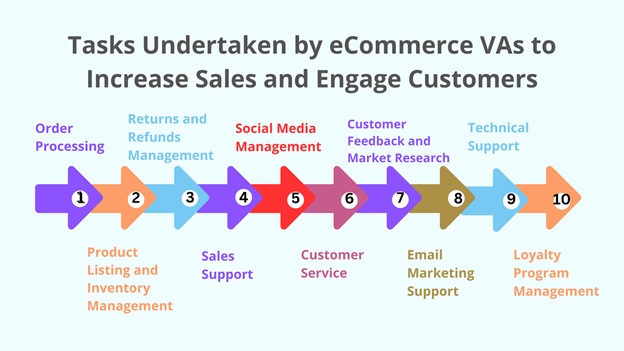
Table of Contents
In the cutthroat world of eCommerce, where cart abandonment rates hover around 70% and customer acquisition costs continue to rise, businesses are trying their best to boost their bottom line.
Enter eCommerce virtual assistants (VAs) – these skilled professionals are revolutionizing online retail operations, offering advantages over freelancers and in-house hires:
- Cost-effective: Lower overhead compared to full-time employees
- Scalable: Easily adjust support levels during peak seasons
- Expertise: Deep knowledge of eCommerce platforms and best practices
- Flexible: Available 24/7 to serve global customer bases
- Reduced management: Require less direct supervision
In this article, we’ll explore the multifaceted roles of eCommerce virtual assistants in enhancing customer satisfaction, optimizing operations, and driving sales.
Common Challenges Faced by eCommerce Businesses:
Before we see how virtual assistants boost eCommerce sales and profits, it’s crucial to understand the challenges online businesses typically navigate:
- Managing inventory across multiple channels
- Providing responsive customer support across time zones
- Keeping up with rapid technological changes and platform updates
- Maintaining consistent product data across various marketplaces
- Handling seasonal demand fluctuations
- Streamlining order fulfillment and returns processes
- Staying competitive in a crowded marketplace
- Balancing personalization with scalability
These challenges highlight the need for flexible, cost-effective solutions that can adapt to the dynamic nature of eCommerce. In the following sections, we’ll see how eCommerce virtual assistant services are emerging as a powerful solution to address these issues and drive business growth.
The Role of eCommerce Virtual Assistants in Boosting Sales and Customer Engagement:

1). Order Processing
eCommerce VAs can streamline the ordering process, which is vital for reducing cart abandonment and increasing conversions. Their attention to detail in every step of the order lifecycle ensures a smooth purchasing experience for customers.
- Manually check and verify orders to prevent errors
- Follow up with customers on abandoned carts through personalized outreach
- Assist customers through the checkout process
- Coordinate with fulfillment teams for timely shipping
2). Product Listing and Inventory Management
Providing accurate and updated product information across all platforms is critical for sales and customer satisfaction. eCommerce VAs ensure this task is handled efficiently and systematically.
- Create compelling product descriptions and optimize listings
- Update inventory levels across multiple platforms
- Monitor competitor pricing and adjust accordingly
- Identify trending products and suggest new additions to the catalog
3). Returns and Refunds Management
Virtual assistants for eCommerce can transform the potentially negative experience of returns into an opportunity for positive customer interaction. They can preserve customer relationships and save sales.
- Guide customers through the returns process
- Process refunds efficiently
- Identify opportunities to save sales through exchanges or store credit
- Gather feedback on reasons for returns to improve products or descriptions
4). Sales Support
By actively engaging in sales activities, virtual assistants for eCommerce can significantly contribute to revenue growth. They serve as an extension of the sales team, nurturing leads and driving conversions.
- Conduct outbound sales calls or send personalized emails
- Manage and nurture leads through the sales funnel
- Provide detailed product information to aid decision-making
5). Social Media Management
When you hire eCommerce virtual assistants, they maintain an active and engaging social media presence on your behalf. Their efforts boost brand awareness and foster customer engagement.
- Create and schedule content across various platforms
- Respond promptly to comments and messages
- Monitor brand mentions and address customer feedback
- Run social media contests and promotions
6). Customer Service
Virtual assistants for eCommerce excel at providing tailored customer support, enhancing the overall shopping experience. This personalized approach can significantly increase customer satisfaction, loyalty, and average order value.
- Offer product recommendations based on customer preferences and history
- Handle complex inquiries with attention to detail
- Offer step-by-step guidance for troubleshooting
- Notify customers about relevant promotions
7). Customer Feedback and Market Research
eCommerce virtual assistant service providers gather and analyze customer feedback, providing valuable insights for business improvement. This data-driven approach facilitates informed decision-making for product development and customer service enhancements.
- Conduct post-purchase follow-ups and satisfaction surveys
- Analyze customer feedback to identify areas for improvement
- Research market trends and competitor offerings
- Provide reports on customer preferences and behavior
8). Email Marketing Support
Email marketing remains a key driver of sales for many eCommerce businesses. VAs can manage these campaigns effectively, ensuring targeted and personalized customer communication.
- Segment email lists for targeted campaigns
- Craft personalized email content
- A/B test subject lines and content for optimal performance
- Analyze campaign results and suggest improvements
9). Technical Support
By providing front-line technical support, VAs help resolve issues that might otherwise prevent sales or lead to customer frustration. Their ability to handle common problems quickly can significantly improve customer satisfaction.
- Troubleshoot common problems customers face on the website
- Guide customers through account creation or password resets
- Assist customers with mobile app usage and features
- Escalate complex technical issues to the appropriate team
10). Loyalty Program Management
VAs can boost customer retention by effectively managing loyalty programs. Their personalized approach helps in making customers feel valued and encourages repeat purchases.
- Enroll customers in loyalty programs
- Explain program benefits and how to earn/redeem points
- Send personalized offers to loyalty program members
- Address inquiries about point balances or reward status
Key Considerations When Hiring eCommerce Virtual Assistants:
Selecting an ideal eCommerce virtual assistant can significantly enhance your business operations and customer satisfaction. Here are key factors to consider when selecting a VA for your eCommerce needs.
1. Relevant Experience
- Industry Knowledge: Ensure the VA has experience in the eCommerce industry and is familiar with diverse platforms and marketplaces like Shopify, Amazon, Walmart, Magento, or eBay. Their knowledge of industry-specific tools and practices can make a significant difference in performance.
- Task-Specific Expertise: Hire eCommerce virtual assistants with proven experience in the specific tasks you need help with, such as customer support, order processing, inventory management, or social media management.
2. Communication Skills
- Proficiency: The virtual assistant for eCommerce should have excellent written and verbal communication skills to interact effectively with your customers and team.
- Responsiveness: Assess their responsiveness during the hiring process. A prompt and clear communicator will likely continue this behavior in their role.
3. Technical Skills
- Tool Proficiency: Check if the assistant is proficient in the tools and software your business uses, such as inventory management systems, customer relationship management (CRM) software, and social media management tools.
- SEO Knowledge: For tasks like product listing optimization, ensure the virtual assistant for eCommerce understands SEO principles to enhance your products’ visibility in search results.
4. Reliability and Accountability
- Track Record: Review the VA’s past work experiences, references, and testimonials to gauge their reliability and accountability.
- Work Ethic: Look for signs of a strong work ethic, such as consistent positive feedback and a history of long-term engagements with previous clients.
5. Flexibility and Availability
- Work Hours: Ensure the VA’s availability aligns with your business hours, especially if you operate in different time zones.
- Scalability: Consider whether the eCommerce virtual assistant can scale their services based on your changing needs, providing flexibility as your business grows.
6. Cultural Fit
- Alignment: The VA should align with your company’s values and culture. This ensures smoother communication and collaboration.
- Team Dynamics: If the VA will work closely with your team, consider their ability to integrate well and contribute positively to team dynamics.
7. Cost and Budget
- Affordability: Determine your budget for hiring a VA and find candidates whose rates fit within this range. Remember, the cheapest option may not always be the best in terms of quality and reliability.
- Value for Money: Assess the value the VA brings to your business. Sometimes, paying a bit more for a highly skilled assistant can result in better performance and higher returns.
Key Takeaway:
To stay competitive in the rapidly evolving eCommerce landscape, hiring a virtual assistant is no longer just an option—it’s a necessity. The versatility and cost-effectiveness of eCommerce virtual assistants make them an invaluable asset for businesses looking to scale operations, enhance customer experiences, and drive sales.
Remember, the goal is not just to reduce costs but to create a more agile, responsive, and customer-centric eCommerce operation. By strategically leveraging eCommerce virtual assistant services, you’ll be well-positioned to overcome common industry challenges and unlock new growth opportunities in the digital marketplace.

Be the first to comment